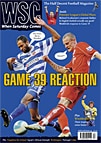 Well, OK, it will be 20 years in May since Wimbledon won the FA Cup, but Robert Jeffery and fellow fans are celebrating early as some key artefacts have at last come home, ending their Buckinghamshire exile
Well, OK, it will be 20 years in May since Wimbledon won the FA Cup, but Robert Jeffery and fellow fans are celebrating early as some key artefacts have at last come home, ending their Buckinghamshire exile
As scenes of triumph go, Morden Library in south London does not seem the most likely venue. Wimbledon fans, however, will take any glory they can get their hands on – which is why, one evening in February, former players, local dignitaries and a group of randomly chosen supporters gathered to celebrate the 20th anniversary of the Dons’ FA Cup victory over Liverpool and, more significantly, the return of the club’s honours from Milton Keynes.
Much has been written about Pete Winkelman’s Franchise operation, most of it mercifully disdainful, but there now seems to be a sense on both sides (albeit more prevalent in Buckinghamshire) that things should “move on” from the unpleasant events of 2002, when what was left of the former Wimbledon FC was shipped up the M1. The Morden event marked the opening of a new exhibition on the combined history of WFC and AFCW, containing photographs, pennants, Dave Bassett’s testimonial tankard and a replica FA Cup.
While none of these items is in itself thrilling – though the exhibition itself is undoubtedly well produced – all have been elevated to the Wimbledon equivalent of the Elgin Marbles through several years’ wrangling and sniping, having been lifted by the club’s administrative staff despite the best efforts of supporters. A pact negotiated last year by the Football Supporters Federation (FSF), between a pleased-as-punch Winkelman (“Wimbledon FC has two sons”) and the Wimbledon Independent Supporters Association (WISA), meant the items could be returned on condition that WISA stop saying beastly things about the Franchise and drop any opposition to Milton Keynes Supporters Trust joining the FSF.
Not that the club’s patrimony was delivered directly to what should be its new home at Kingsmeadow. Instead, like a whimpering hostage, it was entrusted to the care of the authorities: in this case Merton Council, never a friend of the football fan but gradually learning to play the game since WISA-sanctioned Back-to-Merton candidates gathered a small but significant number of votes in local elections.
Which meant there was an understandable air of congratulation in the normally hushed library. Legendary goalkeeper-turned-AFC Wimbledon president Dickie Guy spoke of how “the most important factors” in the life of the club – the fanbase – had never left, and was scathing about the Franchise’s shameful attempts during their inaugural season to list Wimbledon honours in their matchday programme: “The record books show there is only one club with the distinction of a unique Wembley double of FA Cup and FA Amateur Cup.”
Younger fans will now have a very physical reminder that there is more to football in the borough than the struggle to get into the Ryman League play-offs. But not everybody is happy with the accord that brought the return of the honours. WISA does not speak for all supporters, and many would sooner have seen the silverware inserted into a sensitive area of the gurning Winkelman than have entered into a conversation with him, let alone have conditions set on AFCW receiving their rightful trinkets.
Even if fans consider that dropping the FSF boycott – which means Franchise opponents cannot be encouraged by WISA to avoid Stadium MK – is a price worth paying, there is a wider context. Supporters from dozens of different teams showed solidarity with AFCW not because they felt any particular affinity with the club but because they saw a clear injustice taking place and wished to fight the principle of franchising. That wrong has not been righted by the return of the honours, and those fans have every right to wonder what they were fighting for. After all, Winkelman still sees no harm done in the whole affair.
Neither are Franchise the pariahs some would have hoped. A number of websites, most notably Soccerbase and the BBC, still make statistical reference to former Wimbledon players having played for MK, which causes them understandable discomfort: John Scales recently said he was “not happy” about any Franchise association, while Dave Beasant – who attended the anniversary event with Lawrie Sanchez – notes: “None of us played for Milton Keynes and we are proud to remain Wimbledon through and through.” Franchise apologist John Fashanu and fence-sitter Vinnie Jones would be notable dissenters to that view.
Worse still, an adulatory Telegraph article by Tony Francis in February – mentioned in WSC 253 – represented Winkelman’s finest piece of national media coverage to date (though the journalist responsible visited Kingsmeadow a week later to see the other side of the coin, his inbox having collapsed under weight of sheer vitriol). Franchise’s Wembley jaunt in the Johnstone’s Paint Trophy will have unleashed another tidal wave of lazy comparisons between 1988 and 2008 in the press.
Does it matter any more? The Game 39 proposals extend the continent-hopping principles of US sport into British football in the same way the Milton Keynes move was a first step towards American-style franchising of the national game. Both still seem unlikely to become fashionable, at least in the short term, but there are figures in power who have no problem with either becoming commonplace. We may be right to enjoy our own club in their own right rather than wasting energy on sneering at the Franchise, but we forget the dark forces that made their existence possible at our peril.
From WSC 254 April 2008